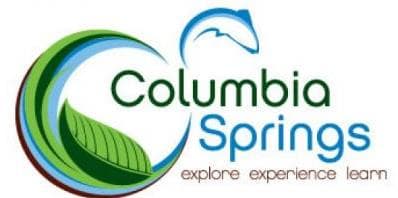
Columbia Springs was created in 1997 through partnership agreements with Clark Public Utilities, Evergreen School District, the Washington Department of Fish and Wildlife, City of Vancouver, Clark County and Clark College. Since its inception, Columbia Springs has provided outdoor learning opportunities for more than 100,000 children and adults through field studies, workshops, service learning projects, summer day camps, community events and more!
Their mission is to provide our community with a unique setting where educational experiences foster a greater awareness of the natural world, inspiring stewardship.
About the Facility: Columbia Springs is located within the Vancouver, WA City limits on more than 100 acres of urban natural land. They offer environmental education programming and services to the community through on-site education for local students in grades K-12 and college and off-site through outreach programs. The facilities and programs are available to all public and private schools in Clark County and to interested adults. They will also do programs for home-school groups, community groups and others. The site is open to the public daily from dawn until dusk and is located on the site of the historic Vancouver Trout Hatchery.
Columbia Spring Features; Hiking trails, grist mill stone display, Lewis & Clark garden, compost demo site, sustainability demo site, fish-rearing ponds, a fish-feeding pond, view decks, wildlife blinds, picnic areas and community events that encourage exploration of nature.
Philosophies:
Personal Connections: When people develop personal connections with nature, through memorable, positive experiences, they also develop respect and accountability for the environment.
Children in Nature: Children are inherently drawn to nature, and when given the opportunity, will effortlessly connect with their natural surroundings.
Life Long Learning: People can continue to develop respect and understanding of nature throughout their lives, through education and experiences.
Modeling Behavior: By modeling environmentally responsible behavior, respect for the environment can be passed from one person to the next.
Sense of Place: Knowledge of a site's history leads to a greater understanding and appreciation of its value to past, present and future generations.
Ways to Help: Volunteer Leads, Stewardship Saturdays, Special Event Volunteering, Student School Projects, Scout Projects, Group Projects, Environmental Education Internships and Volunteers, Restoration Internships and Hatchery Volunteers


Discussion
There are no comments yet.